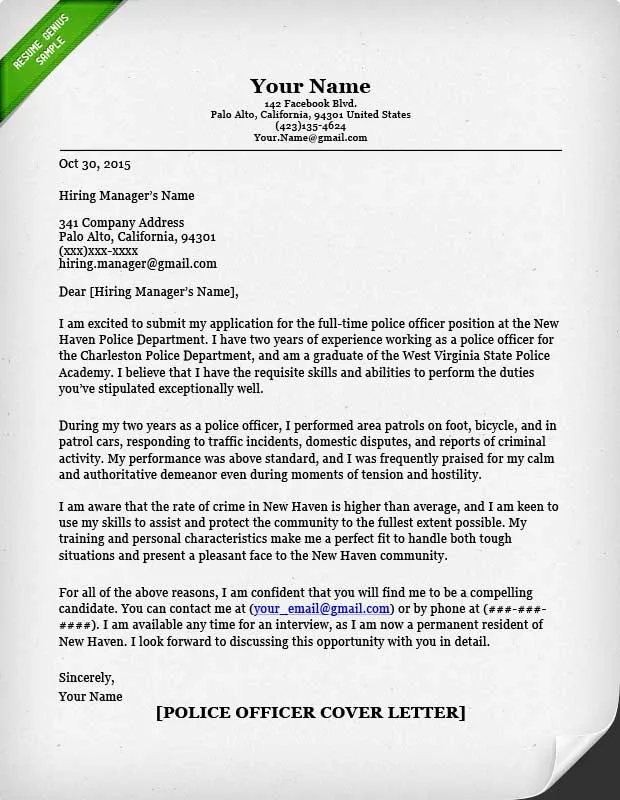Understanding the Importance of a Law Enforcement Cover Letter
A law enforcement cover letter is your first impression on a potential employer, it’s your chance to introduce yourself and make a compelling case for why you’re the ideal candidate. In the competitive field of law enforcement, a well-crafted cover letter is essential. It goes beyond the information in your resume and provides an opportunity to showcase your personality, skills, and passion for the role. This guide will help you write a cover letter that stands out, gets noticed, and lands you an interview. It shows your attention to detail, writing skills, and genuine interest in the position and the agency. A strong cover letter can be the deciding factor in whether or not you move forward in the hiring process.
Why a Cover Letter Matters
A cover letter serves multiple critical functions in the job application process. It acts as a narrative that complements your resume, allowing you to elaborate on your qualifications and provide context to your experiences. It allows you to showcase your communication skills, which are paramount in law enforcement. It demonstrates your ability to clearly and concisely articulate your thoughts, ideas, and experiences. Recruiters and hiring managers often use the cover letter to assess your writing proficiency, attention to detail, and ability to follow instructions. A well-written cover letter sets you apart from other applicants and increases your chances of securing an interview. This is an important tool for law enforcement.
Highlighting Your Skills and Experience
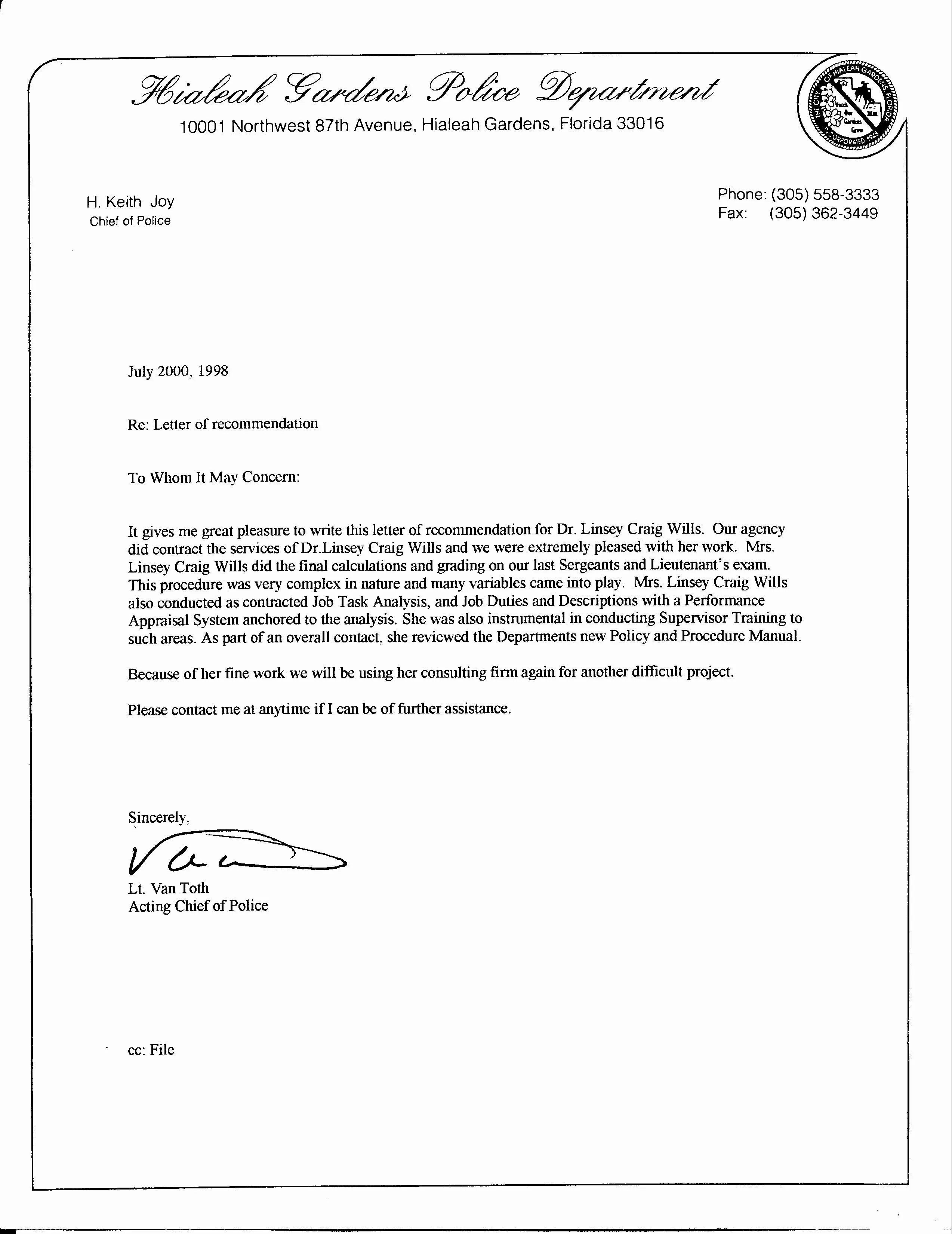
Your cover letter is the perfect place to highlight the skills and experience that make you a strong candidate for a law enforcement position. Identify the key skills and qualifications that the hiring agency is looking for by carefully reviewing the job description. Then, provide specific examples of how you have demonstrated these skills in the past. This could include situations where you demonstrated leadership, problem-solving abilities, or a commitment to community service. Use action verbs to describe your accomplishments and quantify your achievements whenever possible. This will give the hiring manager a clear picture of your capabilities and potential to excel in the role. Tailor your skills and experience to the specific requirements of the job.
Researching the Law Enforcement Agency
Before you begin writing your cover letter, it’s essential to research the law enforcement agency you’re applying to. Understand their mission, values, and any specific requirements or preferences they may have. Visit the agency’s website, read their community outreach initiatives, and familiarize yourself with their recent news or achievements. This research will not only help you tailor your cover letter to their needs, but also demonstrate your genuine interest in working for their organization. If possible, find out the name of the hiring manager or the person to whom you should address your letter. Personalizing your cover letter shows that you’ve taken the time to learn about the agency and are committed to joining their team. This will make you stand out from other candidates.
Key Components of a Law Enforcement Cover Letter
Header and Contact Information
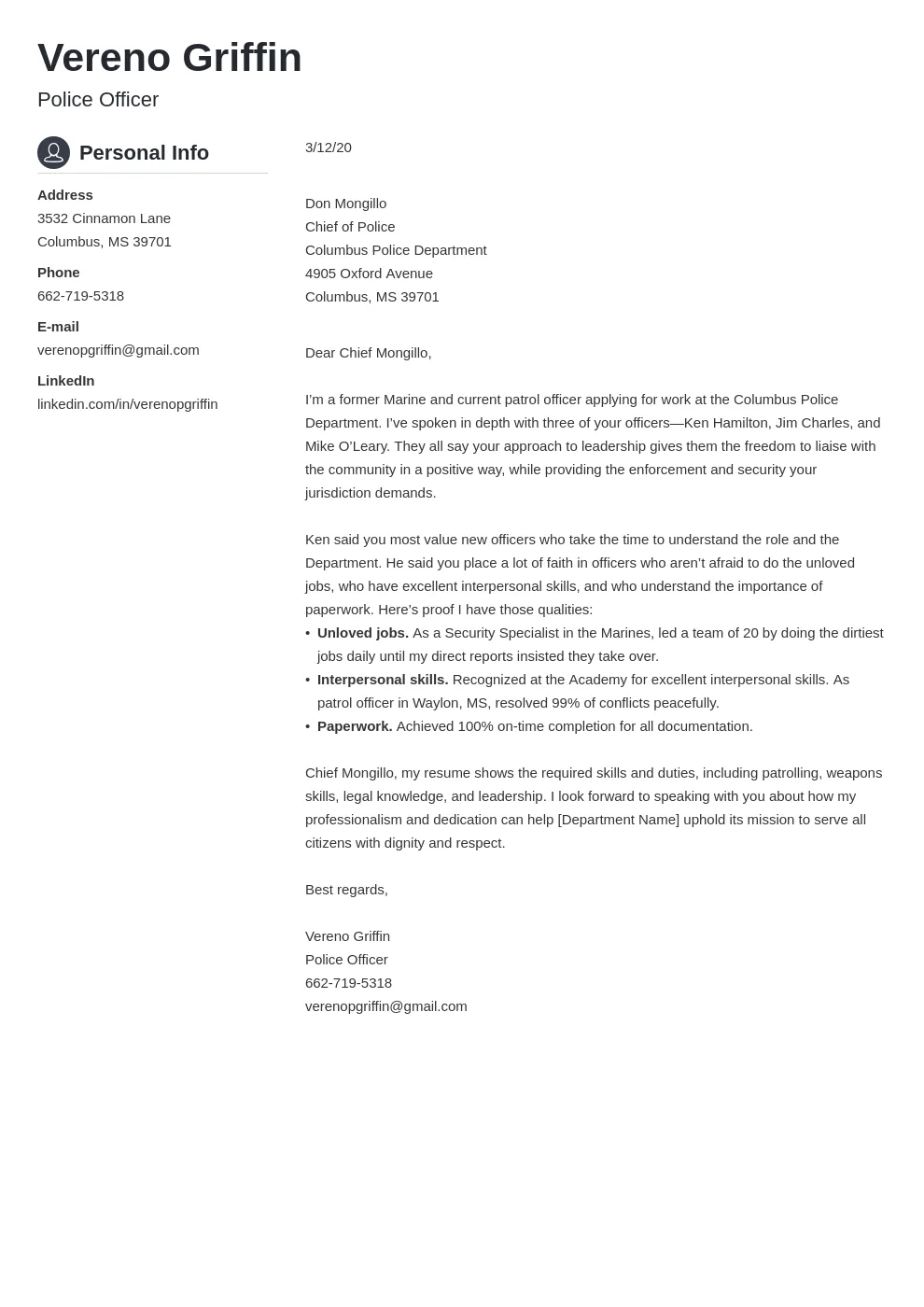
Your cover letter should begin with a professional header that includes your contact information. This section should be clear and easy to read. Include your full name, address, phone number, and email address. Make sure your email address is professional and appropriate for a job application. If you are applying for a specific position, you may also include the date and the name and address of the hiring agency. Ensure your contact information is accurate, so the agency can easily reach you. You should always double-check everything before submitting your application to avoid any errors.
Professional Greeting
Address your cover letter with a professional greeting. Ideally, you should address the letter to the hiring manager or the person specified in the job posting. If you’re unable to find a specific name, you can use a general salutation like “Dear Hiring Manager.” Avoid generic greetings such as “To Whom It May Concern.” Personalizing your greeting shows that you’ve researched the agency and are committed to the application process. This simple step can make a positive impression and demonstrate your attention to detail. It signals to the reader that you’ve taken the time to address them directly.
The Opening Paragraph
The opening paragraph is crucial for grabbing the reader’s attention and setting the tone for your cover letter. Start by clearly stating the position you’re applying for and how you learned about the opportunity. Briefly mention your key qualifications and why you are interested in the agency. Make your opening paragraph concise and impactful, highlighting your enthusiasm for the role and the agency’s mission. This section should entice the reader to continue reading and learn more about your qualifications. It sets the stage for the rest of your letter and should create a positive first impression. It’s your chance to hook the hiring manager.
The Body Paragraphs
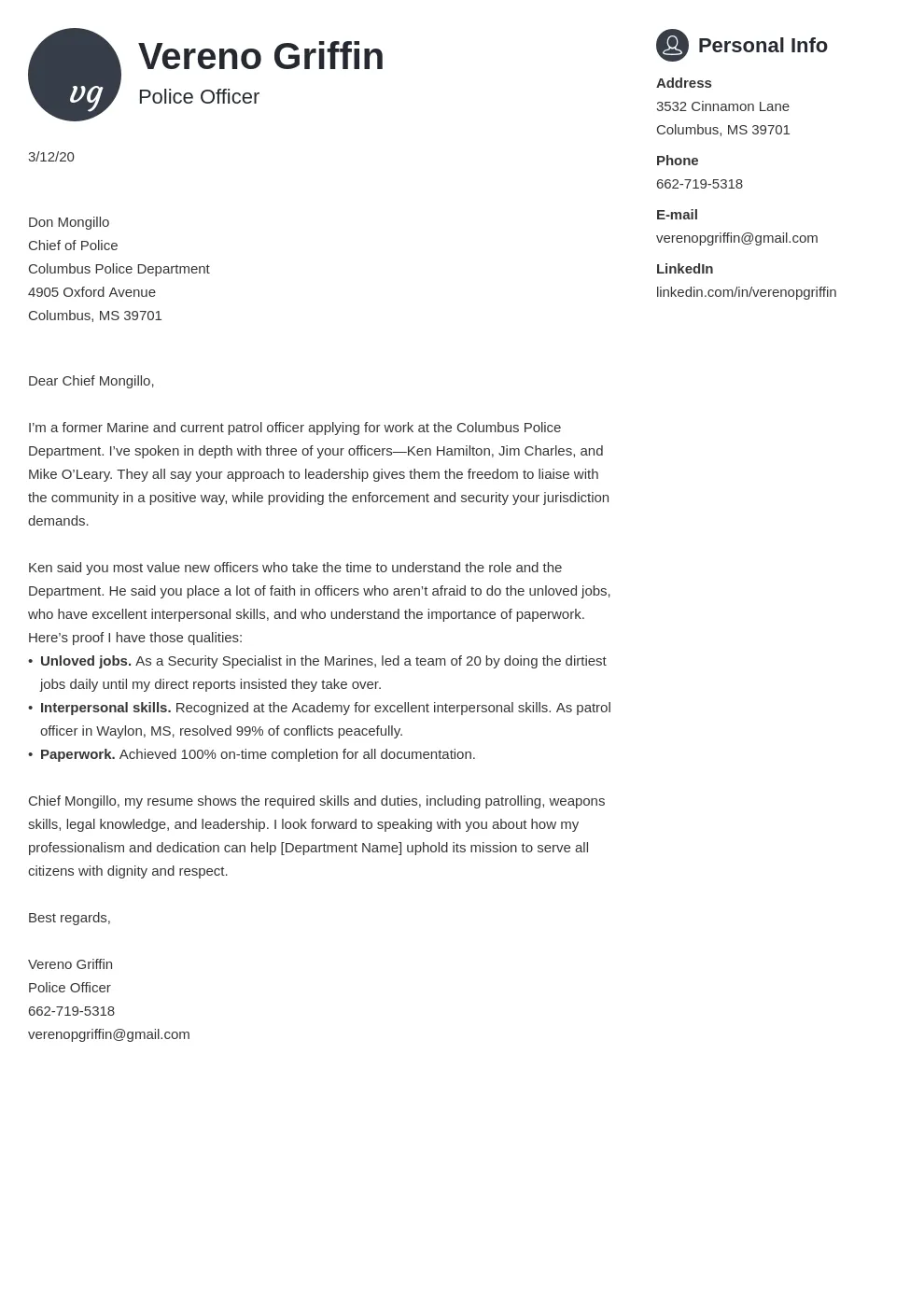
The body paragraphs are where you elaborate on your skills, experience, and qualifications. This is where you showcase your value and make a strong case for why you should be hired. Use these paragraphs to highlight your relevant experiences, focusing on achievements and results. Provide specific examples that demonstrate your abilities, such as problem-solving skills, leadership qualities, and commitment to teamwork. Tailor these examples to the job description, ensuring your qualifications align with the agency’s needs. Use strong action verbs and quantify your achievements whenever possible to make your accomplishments more impactful. Each paragraph should build upon the previous one, creating a cohesive narrative that showcases your strengths.
Showcasing Relevant Skills and Experience
When showcasing your skills and experience, be specific and provide concrete examples. Instead of simply stating that you possess strong communication skills, describe a situation where you effectively communicated with a diverse group of individuals. If you have experience with conflict resolution, provide details on how you successfully de-escalated a tense situation. Highlight any relevant certifications or training, such as firearms qualifications or first aid certifications. Tailor your examples to the specific requirements of the job description, emphasizing the skills and experiences that the agency values most. Make sure to also include how you were able to use these skills.
Quantifying Achievements
Quantifying your achievements makes your cover letter more impactful and demonstrates your value to the hiring manager. Use numbers and data to show the results of your actions. For example, instead of saying you “improved efficiency,” state that you “increased efficiency by 15%.” If you supervised a team, mention the number of people you managed. If you received any awards or recognition, provide the details. Quantifying your achievements adds credibility and allows the hiring manager to quickly understand the impact you’ve made in previous roles. This is a very important factor in law enforcement.
Tailoring Your Letter to the Job Description
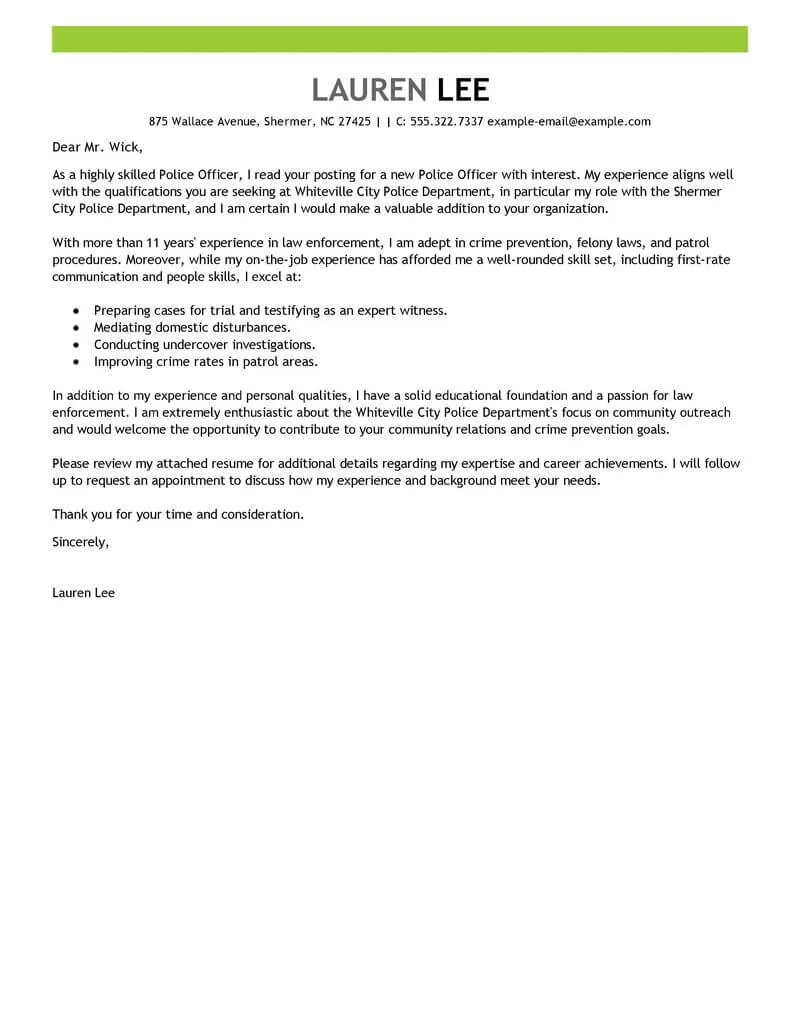
Each law enforcement agency and each job within it will have unique requirements and desired qualifications. Tailoring your cover letter to the specific job description is vital. Carefully review the job posting and identify the key skills, experiences, and qualifications they are seeking. Use the same language and keywords from the job description in your cover letter. Highlight how your skills and experience align with their requirements. Avoid using a generic cover letter, as this can make it appear that you are not genuinely interested in the position. Customizing your letter shows that you have put in the effort to understand the role and are a good fit for the agency. It makes a good first impression and demonstrates your commitment.
The Closing Paragraph
Your closing paragraph should be concise and leave a lasting positive impression. Reiterate your interest in the position and summarize your key qualifications. Express your gratitude for the hiring manager’s time and consideration. Include a call to action, such as stating that you are available for an interview and eager to discuss your qualifications further. End with a professional closing, such as “Sincerely” or “Respectfully.” This final paragraph is your opportunity to reiterate your enthusiasm and leave a positive impression. It is also very important.
Expressing Enthusiasm and Availability
Demonstrate your enthusiasm for the position and your availability for an interview in the closing paragraph. Reiterate your strong interest in the role and the agency. Clearly state that you are available for an interview at their earliest convenience and provide your contact information again if needed. Express your eagerness to discuss your qualifications in more detail and learn more about the opportunity. Your enthusiasm and willingness to follow up will make a lasting impression and increase your chances of getting an interview.
Proper Formatting and Proofreading
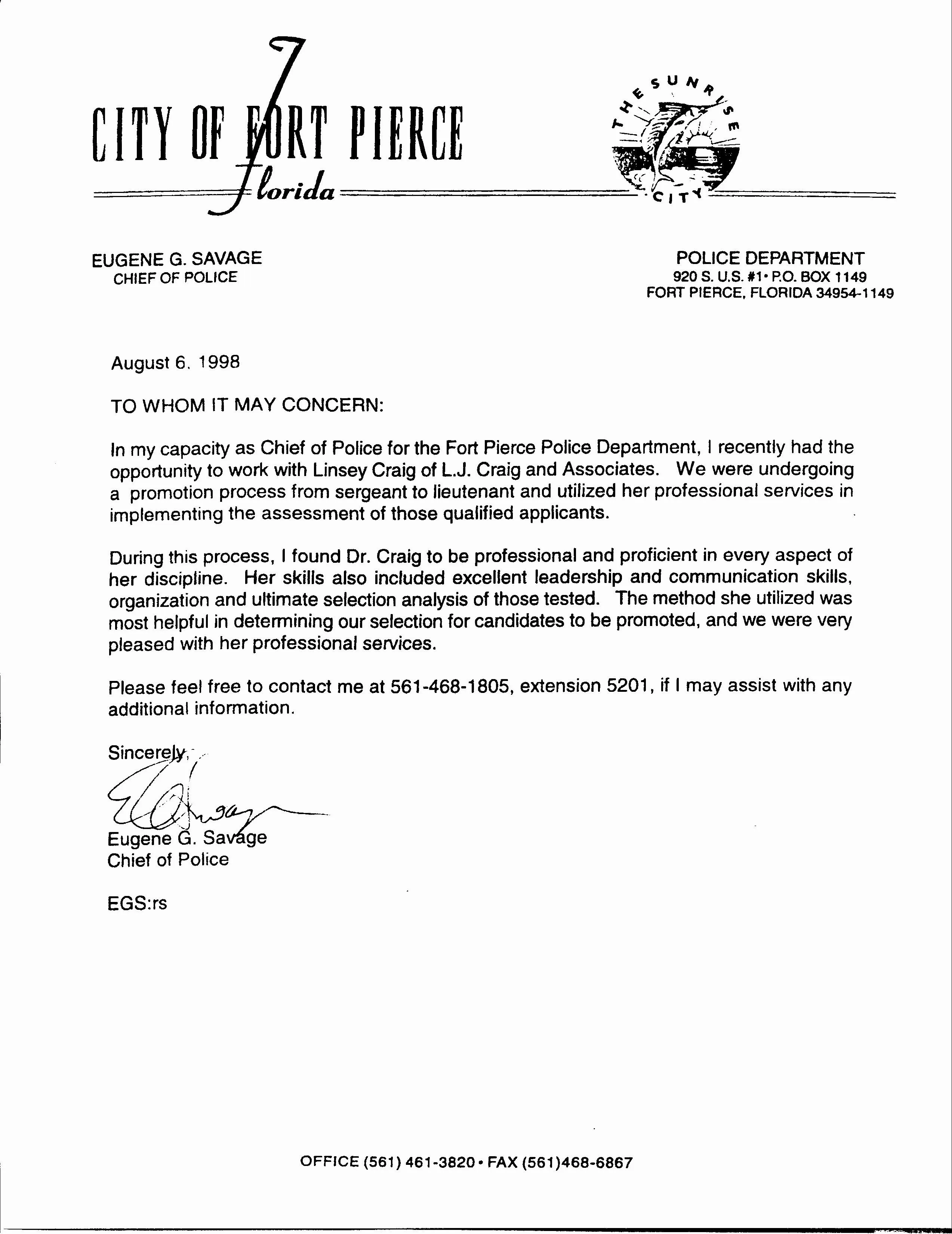
Formatting Guidelines
Formatting your cover letter professionally is crucial for making a positive first impression. Use a clear, easy-to-read font like Times New Roman or Arial in a standard size (11 or 12 points). Use 1-inch margins on all sides of the document. Ensure your paragraphs are well-spaced and properly aligned, typically left-aligned. Use headings and bullet points to break up large blocks of text and make your letter more readable. Maintain a consistent and professional style throughout the entire document. This will show attention to detail. Proper formatting demonstrates that you are organized and professional.
Proofreading Checklist
Before submitting your cover letter, carefully proofread it to ensure there are no errors in grammar, spelling, or punctuation. Read your letter multiple times, ideally aloud, to catch any mistakes. Use spell-check and grammar-check tools, but don’t rely on them completely. Have a friend, family member, or career advisor review your letter for a fresh perspective. Check for any inconsistencies in formatting or language. Ensure your contact information is accurate. Proofreading is a critical step in the application process; it demonstrates attention to detail. A polished cover letter with no errors shows that you pay attention to detail and take pride in your work.
Law Enforcement Cover Letter Examples
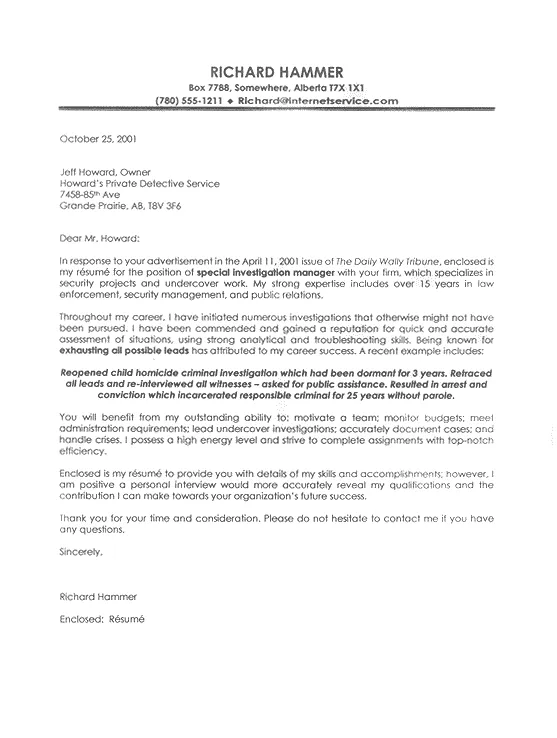
Example 1 Entry-Level Officer
Here’s an example for an entry-level officer. Address it to the hiring manager. “Dear Hiring Manager, I am writing to express my enthusiastic interest in the entry-level officer position with the [Name of Agency], as advertised on [Platform]. As a highly motivated individual with a strong commitment to community service and a deep respect for the law, I am confident that my skills and experience align perfectly with the requirements of this role. I have a Bachelor’s degree in Criminal Justice from [University Name] and have completed extensive coursework in law, ethics, and criminal procedure. During my studies, I actively participated in [relevant activities], which honed my communication, problem-solving, and teamwork skills. I am eager to begin my career in law enforcement with your agency. Sincerely, [Your Name].”
Example 2 Experienced Investigator
Here’s an example for an experienced investigator. “Dear [Hiring Manager Name], I am writing to express my interest in the Investigator position at [Agency Name]. As a seasoned investigator with [Number] years of experience, I am confident in my ability to contribute to your team. During my time at [Previous Agency], I successfully managed [Number] investigations, resulting in [Quantifiable Result]. I have expertise in evidence collection, interviewing, and report writing. I am proficient in [Software or Tools]. I am eager to apply my skills to the challenges presented by [Agency Name]. Sincerely, [Your Name].”
Example 3 Correctional Officer
Here’s an example for a correctional officer. “Dear Hiring Committee, I am writing to apply for the Correctional Officer position at [Correctional Facility Name]. I have extensive experience working with diverse populations in high-stress environments and am adept at maintaining order and ensuring safety. I possess a strong understanding of correctional procedures and have a proven ability to de-escalate tense situations. My experience includes [List Relevant Experience], and I am committed to upholding the highest standards of professionalism and integrity. I am eager to contribute to the safety and security of the facility. Sincerely, [Your Name].”
Common Mistakes to Avoid
Ignoring the Instructions
Carefully read and follow all instructions provided in the job posting. Some agencies may have specific requirements for cover letters, such as length or content. Failing to adhere to these instructions can lead to your application being immediately rejected. Make sure you understand and comply with every detail. This shows attention to detail and respect for the hiring process.
Using Generic Language
Avoid using generic language and clichés that could apply to any job. Tailor your cover letter to the specific agency and the position you are applying for. Use specific examples to showcase your skills and experience, and demonstrate a genuine interest in the role. Avoid generic phrases and vague descriptions. Your cover letter should be unique and personalized to the job. This ensures that the hiring manager views your application positively.
Grammar and Spelling Errors
Grammar and spelling errors can undermine your credibility and professionalism. Always proofread your cover letter carefully and use spell-check and grammar-check tools. Have someone else review your letter before submitting it. Errors can give the impression that you are careless or inattentive to detail, which are qualities that are undesirable in law enforcement. A polished, error-free cover letter shows that you are committed to excellence.
Final Tips for a Winning Cover Letter
Focus on Your Strengths
Highlight your key strengths and how they align with the requirements of the job. Instead of listing your weaknesses, focus on your accomplishments and the skills that make you an ideal candidate. Show the hiring manager what you can bring to the agency. Show them what you do, and do it well. This is the most critical part of your cover letter.
Seek Feedback
Ask a friend, family member, career counselor, or mentor to review your cover letter before submitting it. They can provide valuable feedback on your writing style, content, and overall presentation. A fresh perspective can help you identify areas for improvement and ensure that your letter effectively communicates your qualifications. This can help you to gain a better position.
Follow Up
If you haven’t heard back from the agency within a reasonable timeframe, follow up with a brief email or phone call to inquire about the status of your application. Express your continued interest in the position and reiterate your qualifications. This demonstrates your enthusiasm and initiative. Make sure you are polite and concise. This can leave a positive impression. It is also good to follow up, as this ensures that your application has been received.
